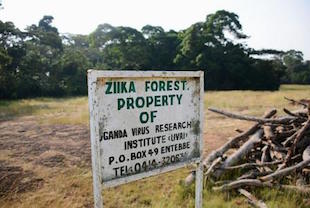NEW YORK | KAMPALA – The unspoiled Zika forest, located on the edge of Lake Victoria, home to birds, leopards, rabbits, pythons and other wildlife, is suddenly abuzz with curious western journalists and others eager to visit the birthplace of the mosquito which has been linked to an alarming condition among new-borns in Brazil.
“People have been calling me and saying, ‘What are you going to do with that mosquito? What are you still doing there?’” recounted a bewildered Gerald Mukisa, the caretaker and tour guide at the forest. “I tell them that I have lived here for seven years and nothing has ever happened to me.”
The Zika virus was first detected in Uganda in the 1940s and among the few studies was one carried out in Nigeria in 1983 looking at the whole family of arboviruses, which also include dengue and yellow fever.
“Fifty six percent of the population had antibodies to the Zika virus in that study,” recalled a researcher from the Liverpool School of Tropical Medicine. “If that was a common experience across much of central and West Africa and it is true that you get lifelong protection, we would be reassured.”
The strain in Africa has not been linked to any cases of microcephaly – an incurable birth defect in a new-born characterized by a small, deformed head. Close to 4,000 cases have been reported in Brazil. Some 3,177 pregnant women have been diagnosed in neighbouring Colombia but microcephaly has not been seen there yet.
Today, the Zika Forest is home to the Uganda Virus Research Institute (UVRI), known to the World Health Organization as a national centre of excellence for viral diagnostics, surveillance and research. The word itself means overgrown in the local Luganda language.
Dr. Julius Lutwama, a leading virologist at UVRI, commented on the now-infamous Zika-carrying mosquito. “The Aedes we have, Aedes aegypti formosus, normally does not bite humans,” he told a group of AP reporters. “And then we have other [mosquitoes] which live in the forests and prefer to bite at dusk and dawn.”
Only two cases of the virus have been confirmed in Uganda since the discovery. However, Dr. Lutwama cautioned: “Because these diseases are closely related and they are being transmitted by the same mosquito, the likelihood of cross immunity is very high.”
Meanwhile, conspiracy theorists are debating on social media whether the Zika virus is “owned” and in private hands. According to a patent lawyer cited by CBCnews, it is not possible to patent something that is naturally occurring, but if an organism is modified in some way, it is patentable. [International Press Syndicate – 9 February 2016]

